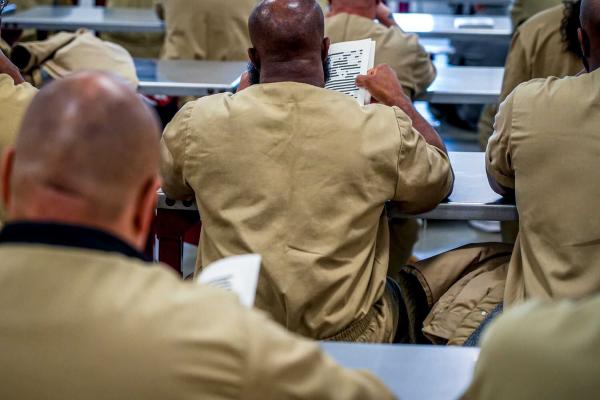When Kamala Harris is sworn in as vice president on Jan. 20, she'll set a number of historic firsts, including becoming the first woman, first Black person, and first Indian American person to be elected vice president of the United States.
Across different faith traditions, a number of women faith leaders in the U.S. broke their own glass ceilings, each marking a historic first within their communities. Amid their diversity, all of the women interviewed here have one common piece of advice for Harris as she becomes the highest-ranking female elected official in U.S. history: Be fully yourself.
Be authentically you
Rev. Dr. Jacqui Lewis is the first African American and first woman to serve as senior minister in the Collegiate Church. Founded in New York City in 1628, the Collegiate Church, which has five city-wide locations, is the oldest continuous Protestant church in North America. At least one of the senior ministers of the Collegiate Church held enslaved Africans.
When she was hired as the senior minister at Middle Collegiate Church, Lewis says she found herself in a hallway lined with portraits of her predecessors: She was surrounded by white, male faces.
According to Lewis, for the first time, her church had to learn “how to have a Black lady leading.”
“Although we had people of color in our congregations, our cultural context was white and male,” Lewis told Sojourners. “I was surprised at the growing pains of the culture [that was] really learning how to hold me fully in my Blackness, my femaleness, my particular kind of power, my particular way of leading.”
It can be tempting to conform to a white, male way of leading if that’s the precedent, Lewis said. The real challenge, Lewis added, will be for Harris to hold herself as exactly who she is, without bending, conforming, or leaving parts of herself out.
“The way we change systems as African American women is to fully inhabit ourselves — to fully inhabit our dreams, our way of thinking — to fully inhabit what it means to have grown up Black in America,” Lewis said. “Kamala’s particular story, my particular story, will change history if we honor our particularity."
For Rev. Dr. Charisse L. Gillett, president of Lexington Theological Seminary, being the first woman and the first African American to be the seminary’s president presented a similar challenge.
Gillet said peers often mistook her male colleagues for “President Gillet” even though news of her hiring was widely shared.
“They had gotten the press release with my bio and my photo, but, they’re so accustomed to this one way of looking at leadership,” she said. “Navigating all of that is part of our journey as women and people of color when we’re entering spaces where people don’t necessarily expect us to be.”
Gillett offers Harris the same advice that helped her get through these interactions: “Be authentically you.” She explained that glass-ceiling breakers are an asset to every room they walk into.
"It’s our experience, it’s our thinking, it’s our intellect, it’s our heart, it’s our history that brings us into these rooms and helps make these rooms different and expand the space so that we can all be heard,” Gillett said. “And so that the needs of all the people that we might represent can be dealt with with integrity and dignity.”
Rev. Dr. Yvonne V. Delk, the first African American woman ordained in the United Church of Christ, agreed.
“Be who you are,” she said. “Claim your values and your visions, affirm that which has made you who you are over all of these years. That will allow you to be an effective instrument in the government.”
You’re never alone
Rt. Rev. Dr. Bonnie Perry was the first female and openly lesbian priest to be elected as bishop of the Episcopal Diocese of Michigan. Her biggest piece of advice is to take others with you as you mark historic firsts.
"No glass ceiling gets broken without an inordinate amount of work from lots and lots and lots of people,” Perry said. “While you’re looking forward ... you’re also looking back down through the hole and dragging as many people along with you as possible. It can’t be just about ourselves, ever.”
Everyone interviewed for this article spoke to the importance of having a good staff, as well as good family, friends, and mentors to rely on. They also emphasized the importance of rest, rejuvenation, and socialization away from the office.
But, in many cases, leaders also carry with them their family and predecessors on whose shoulders they stand, including their ancestors who are no longer alive.
At Delk’s ordination, for instance, Delk felt the presence of all the women from the “Afro-Christian part of the United Church of Christ” who presented themselves for ordination but weren’t accepted.
“When I was kneeling at my ordination in 1974, at that moment of laying on of hands, I really felt myself surrounded by those women — women who never got the affirmation of the system for ordination but invested their gifts and their skills into giving to God the life that God had given to them for the sake of others,” Delk said. “When I arose from my knees and they declared that I was indeed an ordained minister in the United Church of Christ, I felt in my spirit that I was also representing them, too. It felt like I had been able to keep moving from the seeds that they planted. Their spirits were in me and a part of me.”
Likewise, Gillett said she felt a “huge responsibility” to her ancestors upon her election as seminary president.
“I always felt like growing up, there was some level of accountability to my parents’ and grandparents’ hard work,” Gillett said. “You put your pearls on every day and walk out the door, and you carry all of that family history, societal history — all of that obligation and accountability with you.”
Healing a nation
As Harris marks several historic firsts, she also faces a nation that is deeply divided.
Rev. Elizabeth Eaton, the first female presiding bishop of the Evangelical Lutheran Church in America, said that the key to being effective as a historic first and a leader is to remember that the work isn’t actually about you.
“I never thought of myself as a trailblazer or a pioneer, and that’s certainly not why I answered God’s call to go into the ministry,” Eaton told Sojourners. “My advice to Harris is to be true to your call. The mission that has been entrusted to us, whether a calling to serve as the leader of a denomination or to serve as the vice president of the U.S., is bigger than we are.”
Rabbi Sally Priesand, the first female rabbi in the U.S. and the second formally ordained female rabbi in Jewish history, is excited about what the election of Harris means for America.
“One of the lessons we learn from the civil rights movement is that if you don’t see someone who looks like you in a position of leadership, you begin to think it is not possible,” Priesand wrote to Sojourners in an email. “On Jan. 20, new doors will be opened for girls and for people of color; that is an important step forward in the struggle to ensure equality for everyone.”
As Rev. Patricia Davenport, the first female African American bishop of the Evangelical Lutheran Church in America, noted, it behooves leaders to carry along with them not only their support systems but also those who did not vote for them.
“There are some people who did not agree, who did not vote for me to serve in this capacity,” Davenport told Sojourners. “That’s not my focus, but I am mindful of it. I’m called to serve all of the people, even those who didn’t vote for me.”
Similarly, millions of Americans did not vote for Biden and Harris. Davenport encourages Harris to carry those folks along with her by adopting and promoting a posture of unity — by “really putting forward the vision of being a beloved community.”
“That means not only multiracial unity and harmony, but no one in our community suffering lack,” Davenport said.
Enjoy it
One last piece of advice shared by other women who have made history: Enjoy the ride; experience the full joy of the future made possible by your historic first.
Rev. Dr. Erin Swenson, the first transgender minister to serve in the Presbyterian Church (USA), said that sustaining her ordination as a minister while changing her gender expression gave her a unique opportunity to help “scores of people” to whom she would not have been able to minister otherwise.
That very opportunity, said Swenson, who currently works as a marriage and family therapist, is “part of enjoying the ride.”
“For people who care about other people, it's really important to be able to enjoy the good work you can do,” Swenson said. “Because there’s a privilege that comes along with that, and you get to use it, and you get to use it for good. That applies to Harris. She’s going to have some incredible opportunities. She’s got so much that she can do.”
As Rep. Ilhan Omar (D-Minn.), one of the first two Muslim-American women elected to Congress, wrote to Sojourners in an email, it’s easy to get pigeonholed for race, gender, or identity as a historic first. Yet, it’s time for Harris and all women who are breaking glass ceilings to transcend labels and get to work.
“As a first in politics, it’s common to get put in a category that you are only there to be a symbol of diversity and not there to do the work and be an effective legislator,” Omar wrote. “My advice to barrier-breaking women is stop waiting for permission and step into your power. Change starts with us.”
Got something to say about what you're reading? We value your feedback!







